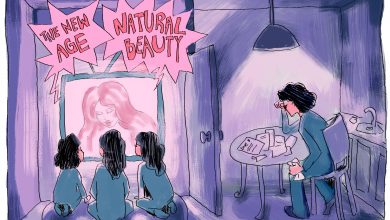Alternative Means of Empowerment and Therapy: Cuddling and Domination

Intimacy worker and healer: Image by Tate via Janaki
Note: This article introduces a term coined by the interviewee – “intimacy work.” This is to distinguish from the concept of a sex worker. Intimacy work deals with the client’s intimate life – their emotions as well as their physical body. Our society treats sex and intimacy interchangeably, but they can and often do exist without the other.
In this interview, intimacy work specifically refers to cuddling and BDSM.
In the current political landscape, the fight for feminism and equality is visible in many activities including participation in protests for immigrant rights, legislation of bills for recognition of the rights of the LGBTQ+ community, and advocating for the emancipation and self-employment of sex workers.
In this arena, a new idea has emerged: the profession of intimacy work. Intimacy workers seek to advance the feminist agenda by promoting the culture of consent and empowering their clients to be assertive, a skill that remains useful not only in the bedroom, but in daily activities which demand forthrightness and self-belief. Intimacy work has the ability to greatly affect the client’s day-to-day life, which is why it is so highly valued.
Paid cuddling as an act of healing (the market rate is $80-$100 per hour) became a profession in 2003 with the founding of the Cuddle Party. Meanwhile, The Dominion, the longest continuously operating dungeon in the United States which practices BDSM, opened in 1980.
In some cases, intimacy workers provide time-constrained bedroom fun, while in the most often-noted scenarios, cuddling and kink help clients work through their emotional and psychological baggage, often leading to healing and better communication with their peers.
Despite the early beginnings and the health benefits, kink and platonic touch are not talked about in public domain. It is time these topics are broached and that we make an effort to dismantle the preconceived notions which mar the conversation.
Tate, a professional cuddler and dominatrix, helps navigate through the world of highly misrepresented and societally stigmatized forms of arts – arts that she firmly believes are therapeutic. In the same line as massages and acupuncture, cuddling and BDSM are elements of touch therapy. The following excerpts are from an in-person interview with Tate, and from her blog.
Would you call yourself a sex worker?
Tate: I practice cuddling and domination, which I consider to be intimacy work. I have also done other kinds of sex work, of which I include the underwear modeling I have done since age 16. I would call myself both a sex and an intimacy worker, though at the moment, I am more of the latter. I help people learn to communicate their desires better, delve into their emotional stress and eradicate shame through use of both soft and hard platonic touch.
What makes intimacy work a movement to empower?
Tate: Both cuddling and BDSM are misrepresented in our society. Intimate touch and sex are two completely different aspects of our lives, though they are often lumped together.
Mutual touch (sexual or nonsexual), releases oxytocin, a hormone that promotes the feeling of trust and bonding and is responsible for the production of dopamine and serotonin.
When this release of hormone oxytocin occurs in a cuddling session or during a BDSM scene as dictated by the client’s needs and desires, it builds self-confidence and reaffirms the need for communication and mutual consent.
Rather than clamming up the body anticipating a threat, the art of intimacy work serves to create a safe space, the limits of which are determined by the client. This empowers the person to identify as a badass as opposed to a victim.
BDSM is known and often portrayed to be power play. How is it different from the depictions in the movie franchise “Fifty Shades of Grey?”
Tate: The movie is a horrible narrative about an abusive relationship and not a typical BDSM relationship at all.
A BDSM session, either with a partner or a client, has an emotional goal. The submissive sets the limits of the scene even if they do not direct it. Thus, when the sub gives power to the dominant and has it come out to be a fulfilling and emotionally rewarding experience, it instills trust and self-worth. It is an experience, that in this era of rape culture and infliction of physical trauma, seeks to help people develop closeness on their own terms and without skepticism. Being able to feel and exercise dominance or submission helps you to advocate for yourself and what you believe in across the entire spectrum of your activities.
If it is so beneficial to seek kink and platonic touch, why do we view it with raised eyebrows?
Tate: Our society both deeply wants and fears sex. Kink and platonic touch are seen as related to sex and, consequently, rarely talked about. With no accurate representations in the media about these, there is a stigma around them. Anyone trying it out is seen as a weird and sick person. While kink especially may seem scary at first, once the boundaries are explicit and clear, it is a loving act that embodies a lot of care and ensures a fulfilling experience for the giver and receiver. Unless the person in naturally drawn to BDSM, the stigma around that kind of play makes it inaccessible to most people.
How does community that identifies as queer fit into the BDSM arena?
Tate: Most of the people I worked with at the dungeon were queer. Most of the sex workers I know are queer. However, I haven’t encountered many clients who identify as queer, which I believe is a consequence of the fact that they are socially ostracized and, thus, often don’t have the monetary means to afford such services, which is why I offer my cuddling services at half-rate to women and queers.
What are your goals in pursuing to enlighten people about these forms of pleasure?
Tate: I have three goals in pursuing this work.
1) Educate people about effective communication and promote consent culture.
2) Garner visibility to help decriminalize sex work, and eradicate societal anxiety around sex.
3) Empower women and queer individuals to stand their ground and state their desires by nurturing self-confidence and self-worth.
While we fight for a better working environment in the sex industry, intimacy workers deserve their share too. In the 21st century, we have recognized the need to decouple intimacy from sex, yet the concept is still wrapped in stigma.
While Tate is a firm advocate of this cause, we could all help if we start questioning societal norms and were open to breaking our internal barriers. Humans have a tendency to reach out to and welcome strangers into their lives, to seek love and compassion. Commodification of this need helps those who do not yet have the skills to acquire healthy touch on their own, and to fulfill their intrinsic need for more oxytocin and dopamine.




